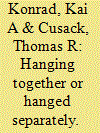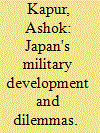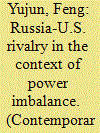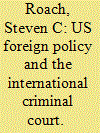| Srl | Item |
| 1 |
ID:
133718


|
|
|
|
|
| Publication |
2014.
|
| Summary/Abstract |
What is the strategic role of membership in an intergovernmental group with unanimity requirements if the group negotiates with an external player in a setting with incomplete information? Being in such a group has a strategic effect compared to negotiating as a stand-alone player and reduces the demands of the outside player. Group membership lends additional bargaining power. Negotiating as a group may also cause more inefficiencies due to bargaining failure, and this may harm also the intergovernmental group. We uncover the role of preference alignment and preference independence between members of the coalition group for equilibrium payoffs and welfare effects. In this analysis, we also distinguish between coalition groups with and without side payments. Overall, coalition groups tend to perform well for the members of the coalition group in comparison to fully decentralized negotiations, particularly if the objectives of the members of the coalition group are not always perfectly aligned.
|
|
|
|
|
|
|
|
|
|
|
|
|
|
|
|
| 2 |
ID:
132791


|
|
|
|
|
| Publication |
2014.
|
| Summary/Abstract |
Japan merits serious study as a diplomatic and strategic power in the twenty-first century for several reasons. Although her population size is declining because of shrinking birth rates and restrictive immigration, the ratio of seniors is increasing --with increasing demands for pensions and state-supported safety nets - and the number of younger participants in the growth of her economy and public life is declining, the Japanese people have demonstrated a high degree of discipline and internal social cohesion at times of war, peace and crisis. An example is their fortitude during the recent (2011) nuclear and tsunami disasters. After 1945, her social and political values stress the importance of harmony and consensus building in her domestic arrangements, and the Japanese people and ruling elites value rejection of war as the sovereign right of the Japanese state. For this reason, domestic public opinion matters in the making and orientation of Japan 's external policies following her defeat in 1945 and with the establishment of a pacifist constitution and constitutional democracy. The population is not easily swayed by radical political and nationalistic rhetoric, even though in recent years, nationalist sentiment has grown in Japan and this was signalled by the election of Prime Minister S/2in;o Abe (2012). Still, despite the centre-right tilt in Japanese public and elite opinion in recent years, the Japanese people demand a thorough assessment of new moves to shift strategic policy and constitutional arrangements on defence issues.
|
|
|
|
|
|
|
|
|
|
|
|
|
|
|
|
| 3 |
ID:
132041


|
|
|
|
|
| Publication |
2014.
|
| Summary/Abstract |
Compared to Soviet-U.S. relations of the Cold War era, contemporary Russia-U.S. relations are less decisively in?uential in shaping the global strategic situation. While evolving, the new relationship between the two sometimes registers dramatic events-Syria and Ukraine, for example-that seem to endanger a proposed "reset" of their bilateral relations. This reset, first mentioned during the presidencies of Dmitry Medvedev in Russia and the first term of Barack Obama in the U.S., was not launched. Since the onset of the global ?nancial crisis, the international strategic situation has further readjusted, and big power relations have remained out of equilibrium. Progress toward improved relations witnessed "apathy" after Vladimir Putin returned to power. Both countries pay less attention to each other in their respective foreign agendas but they are wrestling fiercely in the ?elds of politics, security and geopolitics in spite of an accelerating imbalance of strategic power.
|
|
|
|
|
|
|
|
|
|
|
|
|
|
|
|
| 4 |
ID:
070959


|
|
|
|
|
| Publication |
2006.
|
| Summary/Abstract |
The United States has argued that its military personnel can and should be exempt from ICC investigation and prosecution, and that the ICC Statute should be revised accordingly. Advocates of the ICC have condemned this position by claiming that it undermines the morale of the ICC and is based on false legal and political pretenses. This article proposes a third way of strategic accommodation involving amendments to the ICC Statute that will serve as structured incentives to the U.S. to (re) sign and ratify the ICC Treaty. Such an arrangement will avert the need for special measures that would violate the integrity of the ICC Statute and build consensus within the Assembly of States Parties.
|
|
|
|
|
|
|
|
|
|
|
|
|
|
|
|